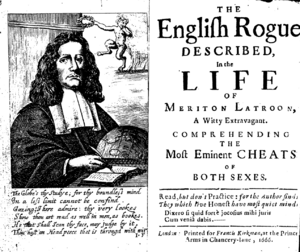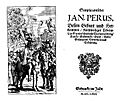Richard Head facts for kids
Richard Head (around 1637 – before June 1686) was an Irish writer, a person who wrote plays (a playwright), and a bookseller. He became famous for his funny novel The English Rogue (1665). This book was one of the first English novels to be translated into other European languages.
Life of Richard Head
Most of what we know about Richard Head comes from a book written by William Winstanley in 1687. Winstanley knew Head personally, so his information is usually trustworthy.
Richard Head was born in Ireland. His father was a minister, but he was killed during the Irish rebellion of 1641. These events might have inspired parts of Head's famous book, The English Rogue. After his father's death, Head's mother took him to England. They lived in different towns like Barnstaple, Plymouth, and Bridport. In Bridport, Richard went to grammar school in 1650.
Later, Head went to Oxford, just like his father. He might have attended New Inn Hall. However, he had to leave college because of money problems. He then became an apprentice to a bookseller in London. This meant he learned the bookselling trade. Winstanley said he became "good" at it.
Head loved writing poetry. His first known work was a funny poem called Venus Cabinet Unlock'd. Around this time, he got married. He also enjoyed gambling, which often led to him losing the money he earned from his books and shop.
Head moved back to Ireland for a while. There, he wrote his first comedy play, Hic et ubique, or, The Humors of Dublin. This play was well-liked. He dedicated it to James Scott, 1st Duke of Monmouth when he returned to England in 1663. The money he received from the Duke wasn't enough, so he continued working as a bookseller in London. He managed to earn a good amount of money quickly, but he often lost it again through gambling.
His book The English Rogue (1665) helped him with his money troubles. This book told exciting adventure stories. It was similar to Spanish "rogue" stories, which were popular at the time. The book also included events that Head claimed were based on his own life.
The book was first rejected by the people who checked books for approval (the censor). But a softer version was later published. This version sold incredibly well! The first edition sold out in less than a year. The publisher, Henry Marsh, died that same year. Francis Kirkman, his business partner, took over the rights. He published four more editions of The English Rogue between 1666 and 1667.
It's not completely clear who wrote the later parts of the book (volumes two, three, and four), which came out in 1671, 1674, and 1680. Winstanley said Head wrote them all. However, in 1675, Head himself said he only wrote the first part. But Kirkman said that he and Head wrote the third and fourth parts together. The introduction to the fourth part is even signed by both men. This makes Head's claim a bit confusing.
Richard Head's name appeared as a publisher on several books. He continued to write until 1677. Winstanley reported that Head drowned while traveling to the Isle of Wight. This report was made in June 1686, which is generally thought to be when he died.
Impact of His Writing
Richard Head's English Rogue was one of the first English storybooks to be translated into another language. It was translated into German in 1672. The German title was very long! It was designed to sell the book in Germany, where a similar popular book called Simplicius Simplicissimus had just come out.
Many other "rogue" stories were written in England after Head's book. One example is The French Rogue (1672). Perhaps the most famous book that was influenced by The English Rogue is Daniel Defoe's The Fortunes and Misfortunes of the Famous Moll Flanders (1722).
Works by Richard Head
Richard Head wrote many different kinds of books. His most famous work was The English Rogue. He also wrote plays, poems, and other stories. Here are some of his notable works:
- Hic et ubique, or, The humours of Dublin a comedy (1663)
- The English rogue described in the life of Meriton Latroon (1665)
- The canting academy, or, The devils cabinet opened (1673)
- The floating island (1673)
- Proteus redivivus, or, The art of wheedling (1675)
- The life and death of Mother Shipton (1677)
Images for kids
 | Claudette Colvin |
 | Myrlie Evers-Williams |
 | Alberta Odell Jones |



